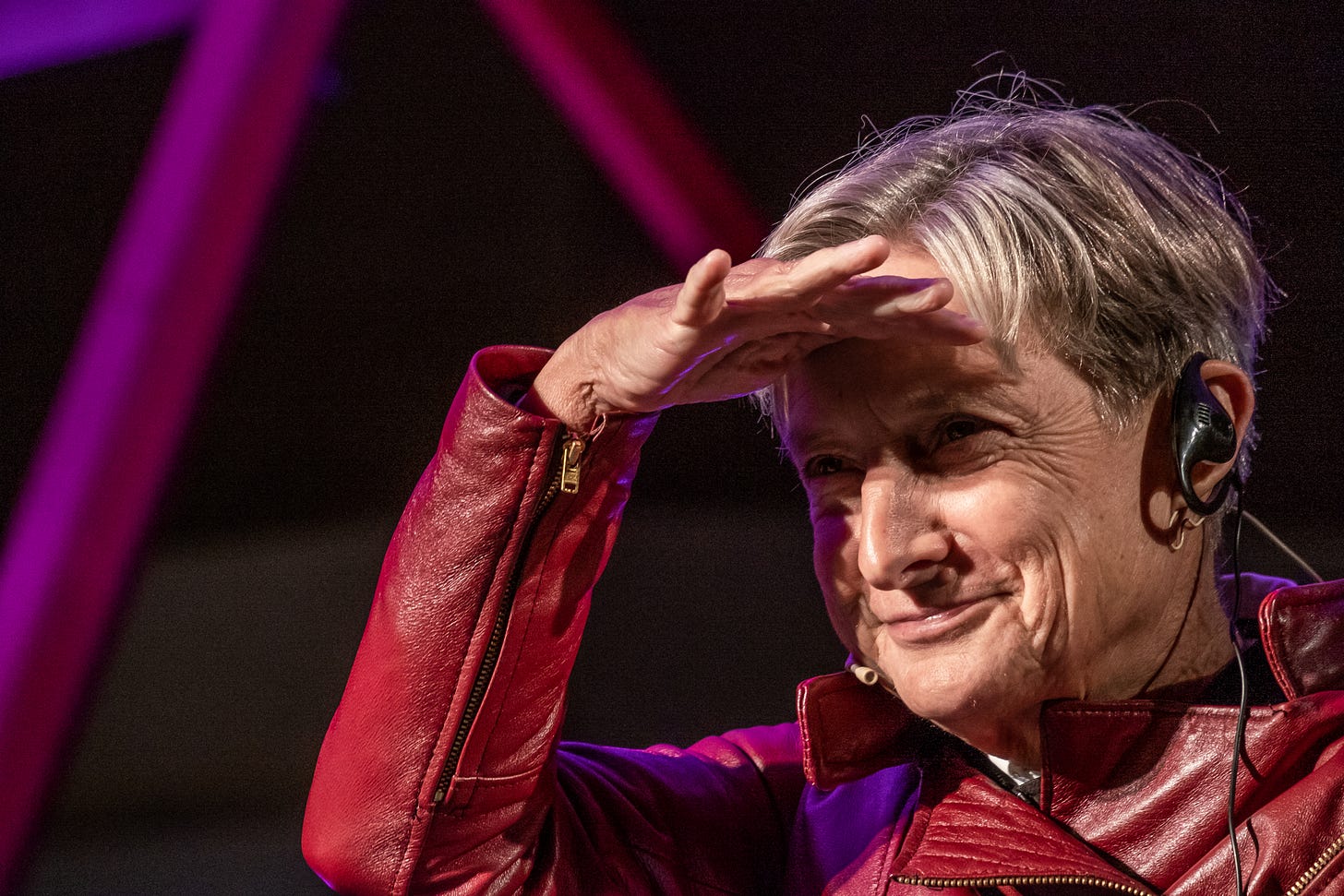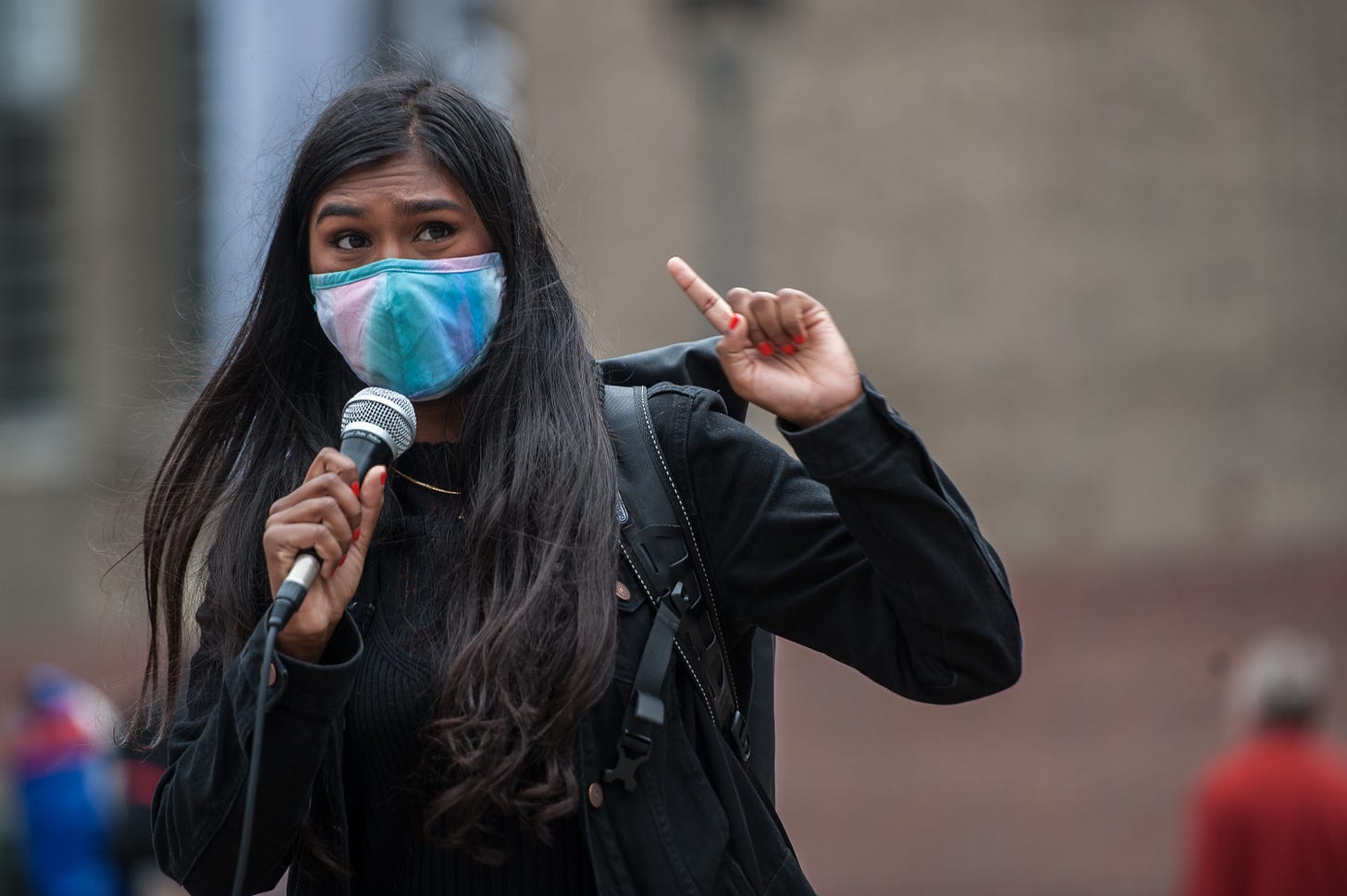What do feminists say about gender ideology?
Judith Butler is in town, and they is lying about the feminist position on gender woo woo, during an interview with Ash Sarkar, she of 'luxury communism' fame. You couldn't make the pair of them up
Judith Butler, looking for thems few remaining brain cells after buying that nice jacket in TK Maxx+++QAI2Spirit
Q: Biological sex is a spectrum. Feminists are biological essentialists
A: Biological sex is immutable and determined from the point of conception. All humans are either male or female, having all of the properties of either one or the other sex. A tiny number of people have some of the properties of both male and female sexes and are described as ‘intersex’. This is a matter of biological fact, it is neither a choice nor an opinion.
Q: My gender is hardwired. How can you say it is a social construction?
A: The definition of 'gender' is the social construction of masculinity and femininity. There is no such thing as biological gender, it is a contradiction in terms. Nor is there any such thing as an individual’s personal gender, since gender is attributed by the culture to a group based on their biological sex. However fixed or queer and fluid you may feel your identity to be, gender is a set of sociocultural norms and stereotypes attributed to the male and female sex respectively. These may be different in different cultures, and they may slowly change over time, but the point is that all women are meant to be 'feminine' and all men to be 'masculine' according to the norms of their culture.
Q: But my gender identity is deeply personal and you are denying my reality.
A: You are confusing ‘personality’ with ‘gender’. Feminists have always challenged the obligation of men and women to fulfil their culture's gender expectations and have defended the rights of those who do not conform (for example, lesbians) to interpret and develop our personalities as we see fit. Every man and woman has a unique personality, and every individual will exhibit traits that do not necessarily correspond to the gender attribution of their society. If society cannot accommodate men who like pink, or women who want to do woodwork, it is the society that needs to change, not the individual.
Q: Why do some feminists hate transwomen?
A: Quite simply: they don’t. But feminists tend not to BELIEVE in the ‘trans’ phenomenon. Ascribing hate to women campaigning against male violence is a myth circulated, particularly about lesbian feminists, to silence them. It is the same as calling us ‘man-haters’. Critiquing gender ideology is not hatred towards any individual or group, just as critiquing sexism and gender ideology is not hatred of men as individuals or as a group. Critiquing trans ideology, particularly those aspects which affirm gender dualism, is just part of the feminist challenge to sexism and misogyny in general.
Ash Sarkar, fucking up like a champion
Q: Why are so many feminists reverting to the 'biology is destiny' argument? Is that not essentialism?
A: Feminists were the first to challenge the notion that biology should determine our social and political destiny. Essentialism is a belief that some traits are common to all members of a group with shared biological characteristics, and thus to every woman or man respectively. For instance, that 'women are more peaceful and caring' or 'men are more rational and aggressive'. But character traits and behaviour depend on personality not on biological sex, although some of these traits may be influenced by the way that gender is expressed within particular cultures and communities. Some people may try to adapt their personality to conform to cultural gender expectations of a 'real man' or a 'real woman'. Other people choose to discover their unique personal qualities and develop them, whether they conform to or deviate from the gender description.
Q: If feminists are not essentialist, why are they defending women-only spaces?
Feminist are not arguing that women have common characteristics, they are arguing that they have common experiences. Women-only spaces or black caucuses are a form of organising among oppressed groups for discussing personal experience of sexism and/or racism as a means of political consciousness-raising, without the presence of men and/or white people which would alter and inhibit the discussion. The same is true of the provision of women-only services, or services tailored to the needs of black and minority ethnic communities. These spaces and services are part of a necessary defence against the power differential between men and women, and white and black people respectively, which is the root of the structural violence of sexism and racism. Free assembly is a fundamental social right. Trade unions may meet outside the presence of the bosses. Women-only spaces and services have until recently been protected but these are now under siege.
Q: Young women identifying as non-binary is surely radical? They are refusing to be limited by the imposition of the identity 'woman'.
A: Many young women identifying as non-binary/trans are indeed attempting to disrupt gender rules and norms, as many other women and feminists of all ages do in other ways. However, gender non-conformity does not alter the reality of biological sex. Feminists challenge the assumption that biological sex should constrain women's social and political destiny. Instead they insist that men's social and political behaviour towards women has to change. How individuals choose to identify does not change the social and political structural violence they experience, which is based on biological sex, racial assignation and skin colour. Only political struggles will bring about structural change. Feminism is a collective political struggle, not a means of individual personality development.
Q: Feminists who fight for the right to women-only space and who question transgender ideology are a hate group, surely?
A: Fighting to retain our hard-won sex-based rights is necessary so long as male violence exists. Transgender ideology has its roots in 1950s sexism and many segments of the transgender movement are openly misogynist and hostile to feminism in the current day.
Q: Feminists who want to exclude transwomen from women-only spaces are on the wrong side of history. In the future, people will look back and see that the trans-rights movement is one of the key human rights movements of our time, just like the black civil rights movement of the 1960s.
A: Transwomen are males. They have been socialised as men and therefore benefited from male power. All trans-identified people deserve to live free of discrimination and abuse but not at the expense of the rights of girls and women.
Q: But aren’t left-wing lesbian feminists all fascists these days, supporting Viktor Orbán and Donald Trump?
A: Oh DO bugger off, you absolute plonkers!
A muppet. In a bin.







I have blocked Derpetology101 for his vile comments
Julie, I enjoyed this a lot. Thank you!